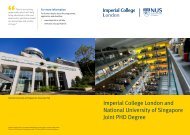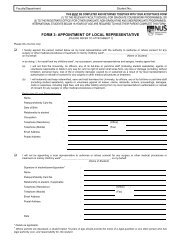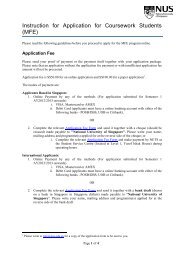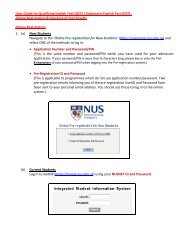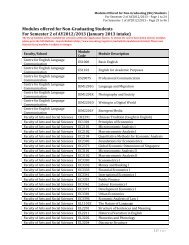engineering
engineering
engineering
You also want an ePaper? Increase the reach of your titles
YUMPU automatically turns print PDFs into web optimized ePapers that Google loves.
allow students to sell their ideas to the whole class and<br />
accept and/or defend critical evaluations.<br />
Students propose a problem, the solution of which will<br />
improve our quality of life. They then proceed to analyse<br />
the problem and find solutions to it. In the working<br />
sessions, the students present their problems, ideas and<br />
solutions to peers and the group of mentors. The whole<br />
class is engaged in active discussion throughout the<br />
working sessions, and students are continuously<br />
assessed during these sessions by the mentors. At the<br />
end of the programme, the students are expected to<br />
produce a prototype or a demonstrable system and to<br />
make a presentation to convince others of the value of<br />
the proposed idea, procedure or device. Peers will<br />
contribute to the evaluation of the success of the idea<br />
and product generated. The mentors will monitor the<br />
progress, and facilitate project development.<br />
Students outside the Faculty of Engineering are<br />
encouraged to join to form mutli-disciplinary teams in<br />
the class project. By taking part in the programme,<br />
the students are expected to learn that existing forms<br />
of schemes and procedures in practice can be<br />
challenged, but, at the same time, there are significant<br />
merits and strengths in existing schemes<br />
and procedures. Students will be able to create<br />
something meaningful to improve our quality of life.<br />
Assessment will be 100% continuous and there is no<br />
final examination.<br />
For more information, please refer to:<br />
http://www.eng.nus.edu.sg/undergrad/epmc/ip.html<br />
3.4.5 EG2605 Undergraduate Research Opportunities<br />
Programme (4 MCs)<br />
EG2605 Undergraduate Research Opportunities<br />
Programme (UROP) provides an opportunity for students<br />
to do research at an early stage in their candidature.<br />
They would be able to (a) acquire skills involved in the<br />
intellectual process of inquiry, (b) enhance their<br />
knowledge of the latest technology and (c) interact with<br />
faculty members so as to foster closer ties. Students<br />
have to complete Stage 1 of their course to gain good<br />
fundamental <strong>engineering</strong> knowledge to handle the<br />
EG2605 programme on research and development work<br />
in the laboratory. Students are expected to work on the<br />
UROP project for at least 130 hours, which may be<br />
spread over two semesters. At the end of the project,<br />
UROP students have to submit a six- to eight-page<br />
paper to their supervisors. The assessment guidelines<br />
for satisfactory grading are based on students (i) having<br />
done a literature survey of the research area, (ii) having<br />
defined the problem clearly and proposing a hypothesis<br />
or a model for the problem, (iii) designing a solution<br />
procedure/experiment to study the hypothesis or<br />
analyse the problem, (iv) obtaining the data and<br />
evidences to support the hypothesis and (v) drawing<br />
conclusions and making suggestions for future studies.<br />
For more information, please refer to:<br />
http://www.eng.nus.edu.sg/urop<br />
3.4.6 EG2606A/B Independent Work Programme (2<br />
and 4 MCs)<br />
This programme aims to promote self-study, critical<br />
thinking and independent research ability. Possible<br />
independent work activities include systems development<br />
(e.g., hardware/software systems and mechanical<br />
…232…<br />
systems) and participation in recognised national and<br />
international competitions. Students have to complete<br />
Stage 1 of their study to have sufficient basic<br />
<strong>engineering</strong> knowledge in order to propose a meaningful<br />
project and to work independently on the project with<br />
minimum supervision. Projects are initiated by students<br />
individually or as a team of not more than four members<br />
by submitting a proposal to the Dean’s Office. The<br />
proposal will outline the background, nature and scope<br />
of the activity and should also include a statement of the<br />
learning objectives. In order to successfully complete the<br />
project and receive credit for EG2606A/B, students must<br />
achieve the learning objectives stated in the proposal<br />
and submit a short project report. Students can either<br />
register for the EG2606A Independent Work (2 MCs)<br />
for work totalling a minimum of 65 hours, or EG2606B<br />
Independent Work (4 MCs) for work totalling a<br />
minimum of 130 hours.<br />
For more information, please refer to:<br />
http://www.eng.nus.edu.sg/undergrad/ep/iw.html.<br />
3.5 Special Programmes<br />
3.5.1 University Scholars Programme<br />
Students may apply to join the University Scholars<br />
Programme (http://www.scholars.nus.edu.sg/) prior to<br />
enrolment into NUS. Students from the Faculty of<br />
Engineering are admitted into the Scholars Programme<br />
on the basis of their academic and co-curricular<br />
achievements, a written essay, an interview and an<br />
<strong>engineering</strong> aptitude test. University Scholars in Faculty<br />
of Engineering take a slightly different combination of<br />
modules from that of other students at the Faculty:<br />
• Eight First Tier modules offered by the Scholars<br />
Programme, which include one Critical Thinking<br />
and Writing module, three science-based modules<br />
and four humanities-based modules (of which one<br />
should be Singapore Studies themed); students<br />
who choose to read the University Scholars<br />
Seminar module will have one less humanitiesbased<br />
module requirement.<br />
• Advanced Curriculum modules equivalent to 16<br />
MCs from the Faculty of Engineering or other<br />
faculties (with prior permission from Faculty of<br />
Engineering).<br />
• Two years’ equivalent of modules in an <strong>engineering</strong><br />
discipline of the student’s choice.<br />
Engineering USP students may replace up to 48 MCs of<br />
modules under the University Level Requirements and<br />
Unrestricted Elective Modules as well as the following<br />
modules: EG1413 Critical Thinking and Writing, SSAxxxx<br />
Singapore Studies, and HR2002 Human Capital in<br />
Organizations. First Tier modules may be taken any time<br />
within the four years of study, although it is preferable<br />
that the students complete them by the fifth or sixth<br />
semester. Currently, the Faculty offers one Course based<br />
Advanced Module: UEG4001 Broadband Networking and<br />
numerous topics at Level-3000 or 4000 that can be taken<br />
as Independent Study Modules (ISMs). For ISMs, students<br />
are required to work out a contract with the relevant<br />
mentors on the study topic. The students can also read<br />
the USP Multidisciplinary Seminar modules (UMSs)<br />
towards their Advanced Curriculum modules<br />
requirements. The Advanced Curriculum modules taken<br />
will satisfy the UE requirements.



